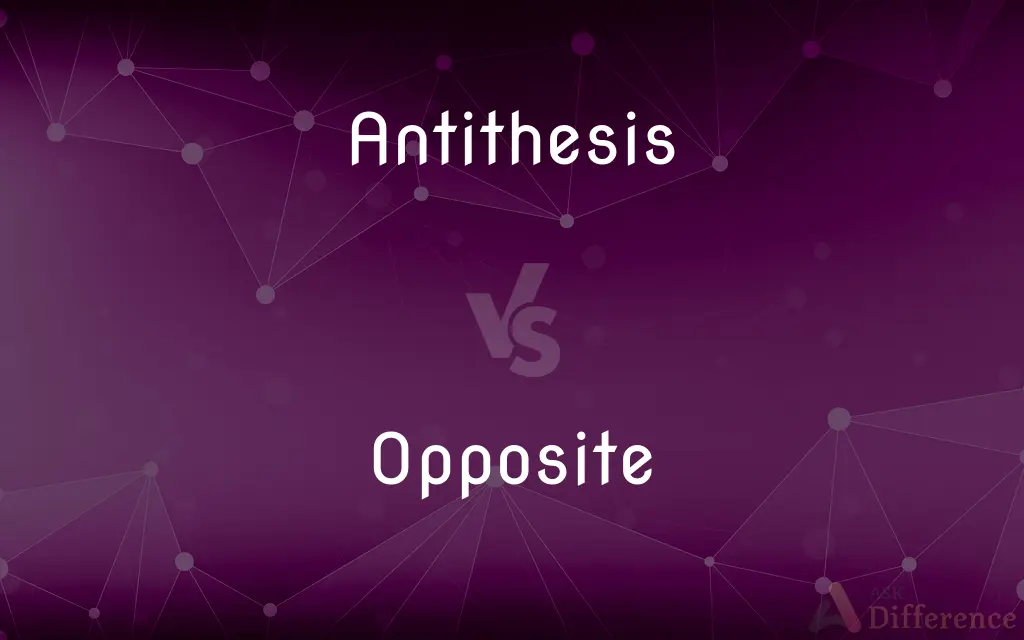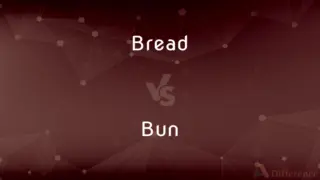Antithesis vs. Opposite — What's the Difference?
By Fiza Rafique & Maham Liaqat — Updated on April 24, 2024
Antithesis involves a direct contrast in language to emphasize differences, often used in rhetoric; opposite refers to a position or situation directly contrasting another, typically in spatial or logical terms.

Difference Between Antithesis and Opposite
Table of Contents
ADVERTISEMENT
Key Differences
Antithesis is a rhetorical device used to express contrasting ideas in a balanced, parallel structure, emphasizing the difference through direct contrast. Whereas, the term opposite generally refers to something that is diametrically different from another thing, especially in position or characteristics.
Antithesis often appears in speeches and literature to create a clear dichotomy between two opposing concepts, enhancing the clarity and impact of an argument. On the other hand, opposite can be used in everyday language to describe physical positions, opinions, or even abstract concepts that are fundamentally different or contrary to each other.
In antithesis, the emphasis is on the juxtaposition of ideas to highlight distinctions or create dramatic tension. Whereas opposite may simply denote things that are inherently different without any rhetorical enhancement or specific literary intent.
Antithesis is primarily a literary and rhetorical tool that enhances textual or spoken arguments. Opposite, however, is a broader term used in various contexts including mathematics, geometry, philosophy, and general discourse.
While antithesis is typically employed for stylistic effect and to provoke thought or highlight moral or ethical dilemmas, opposite is often used to convey straightforward information about the relationship between entities, making it more utilitarian in nature.
ADVERTISEMENT
Comparison Chart
Definition
A rhetorical device to juxtapose contrasting ideas.
A relation or position diametrically different.
Usage in Speech
Used to enhance rhetoric and emphasize contrast.
Used to describe direct contrast or contradiction.
Literary Significance
High, often used to provoke thought or dramatize.
Lower, usually descriptive or informative.
Context of Use
Primarily literary, speeches, and debates.
Wide ranging, from everyday use to academic contexts.
Example of Use
"Give every man thy ear, but few thy voice."
North pole is opposite to the south pole.
Compare with Definitions
Antithesis
Use in speeches to emphasize a point through contrast.
We must learn to live together as brothers or perish together as fools.
Opposite
Being diametrically different from something else.
The opposite of love is not hate, it's indifference.
Antithesis
A rhetorical device juxtaposing two contrasting ideas.
Man proposes, God disposes.
Opposite
A position directly across from something, especially in direction.
He sat on the opposite side of the table.
Antithesis
A literary technique for enhancing drama or argument.
Not that I loved Caesar less, but that I loved Rome more.
Opposite
Relating to two ideas that are completely different.
Freedom is the opposite of captivity.
Antithesis
A method to highlight the difference through parallel structures.
To err is human; to forgive, divine.
Opposite
In mathematics, referring to the inverse or contrary.
Additive opposites sum to zero.
Antithesis
A feature in writing that creates a clear dichotomy.
It was the best of times, it was the worst of times.
Opposite
Used to describe things that are inherently contrasting.
Hot is the opposite of cold.
Antithesis
Antithesis (Greek for "setting opposite", from ἀντί "against" and θέσις "placing") is used in writing or speech either as a proposition that contrasts with or reverses some previously mentioned proposition, or when two opposites are introduced together for contrasting effect. This is based on the logical phrase or term.Antithesis can be defined as "a figure of speech involving a seeming contradiction of ideas, words, clauses, or sentences within a balanced grammatical structure.
Opposite
Placed or located directly across from something else or from each other
Opposite sides of a building.
Antithesis
Direct contrast; opposition.
Opposite
Facing the other way; moving or tending away from each other
Opposite directions.
Antithesis
The direct or exact opposite
Hope is the antithesis of despair.
Opposite
Altogether different, as in nature, quality, or significance
The effect of the medication was opposite to that intended.
Antithesis
A figure of speech in which sharply contrasting ideas are juxtaposed in a balanced or parallel phrase or grammatical structure, as in "Hee for God only, shee for God in him" (John Milton).
Opposite
Sharply contrasting; antithetical
Had opposite views on the subject.
Antithesis
The second and contrasting part of such a juxtaposition.
Opposite
Growing in pairs on either side of a stem
Opposite leaves.
Antithesis
The second stage of the Hegelian dialectic process, representing the opposite of the thesis.
Opposite
Arranged on the same radius as another part, as stamens and petals.
Antithesis
A proposition that is the diametric opposite of some other proposition.
Opposite
One that is opposite or contrary to another.
Antithesis
(rhetoric) A device by which two contrasting ideas are juxtaposed in parallel form; a figure of speech arranged in this manner
Opposite
An opponent or antagonist.
Antithesis
An opposition or contrast of words or sentiments occurring in the same sentence; as, "The prodigal robs his heir; the miser robs himself." "He had covertly shot at Cromwell; he how openly aimed at the Queen."
Opposite
An antonym.
Antithesis
The second of two clauses forming an antithesis.
Opposite
In an opposite position
They sat opposite at the table.
Antithesis
Opposition; contrast.
Opposite
Across from or facing
Parked the car opposite the bank.
Antithesis
Exact opposite;
His theory is the antithesis of mine
Opposite
In a complementary dramatic role to
He played opposite her.
Antithesis
The juxtaposition of contrasting words or ideas to give a feeling of balance
Opposite
Located directly across from something else, or from each other.
She saw him walking on the opposite side of the road.
Opposite
(botany) Of leaves and flowers, positioned directly across from each other on a stem.
Opposite
Facing in the other direction.
They were moving in opposite directions.
Opposite
Extremely different; inconsistent; contrary; repugnant; antagonistic.
Opposite
Something opposite or contrary to something else.
Opposite
A person or thing that is entirely different from or the reverse of someone or something else; used to show contrast between two people or two things.
She is the opposite of her ex-boyfriend who abused her both physically and verbally nearly every day for five years. She now works as an advocate and supportive listener for others who have endured abusive relationships.
Opposite
An opponent.
Opposite
An antonym.
"Up" is the opposite of "down".
Opposite
(mathematics) An additive inverse.
Opposite
In an opposite position.
I was on my seat and she stood opposite.
Where's the bus station? -Over there, just opposite.
Opposite
Facing, or across from.
He lives opposite the pub.
Opposite
In a complementary role to.
He played opposite Marilyn Monroe.
Opposite
(television) On another channel at the same time.
The game show Just Men! aired opposite The Young and the Restless on CBS.
Opposite
Placed over against; standing or situated over against or in front; facing; - often with to; as, a house opposite to the Exchange; the concert hall and the state theater stood opposite each other on the plaza.
Opposite
Situated on the other end of an imaginary line passing through or near the middle of an intervening space or object; - of one object with respect to another; as, the office is on the opposite side of town; - also used both to describe two objects with respect to each other; as, the stores were on opposite ends of the mall.
Opposite
Extremely different; inconsistent; contrary; repugnant; antagonistic.
Novels, by which the reader is misled into another sort of pleasure opposite to that which is designed in an epic poem.
Particles of speech have divers, and sometimes almost opposite, significations.
Opposite
Set over against each other, but separated by the whole diameter of the stem, as two leaves at the same node.
Opposite
One who opposes; an opponent; an antagonist.
The opposites of this day's strife.
Opposite
That which is opposed or contrary in character or meaning; as, sweetness and its opposite; up is the opposite of down.
The virtuous man meets with more opposites and opponents than any other.
Opposite
Two words that express opposing concepts;
To him the opposite of gay was depressed
Opposite
A relation of direct opposition;
We thought Sue was older than Bill but just the reverse was true
Opposite
A contestant that you are matched against
Opposite
Something inverted in sequence or character or effect;
When the direct approach failed he tried the inverse
Opposite
Being directly across from each other; facing;
And I on the opposite shore will be, ready to ride and spread the alarm
We lived on opposite sides of the street
At opposite poles
Opposite
Of leaves etc; growing in pairs on either side of a stem;
Opposite leaves
Opposite
Moving or facing away from each other;
Looking in opposite directions
They went in opposite directions
Opposite
Altogether different in nature or quality or significance;
The medicine's effect was opposite to that intended
It is said that opposite characters make a union happiest
Opposite
Characterized by opposite extremes; completely opposed;
In diametric contradiction to his claims
Diametrical (or opposite) points of view
Opposite meanings
Extreme and indefensible polar positions
Opposite
Directly facing each other;
The two photographs lay face-to-face on the table
Lived all their lives in houses face-to-face across the street
They sat opposite at the table
Common Curiosities
How is antithesis used in literature?
In literature, antithesis is used to create dramatic tension or highlight a strong contrast between ideas.
What does opposite mean?
Opposite refers to something that is diametrically different from another in position, direction, or characteristics.
What is antithesis?
Antithesis is a rhetorical device used to express contrasting ideas in a balanced, parallel structure.
What is the effect of using antithesis in rhetoric?
The effect of using antithesis in rhetoric is to emphasize contrasts and make the argument more compelling.
Why is antithesis important in persuasive speech?
Antithesis can make a speech more persuasive by clearly outlining the differences between opposing viewpoints.
Is opposite always related to physical location?
No, opposite can also describe abstract concepts or qualities that are inherently different.
Can antithesis be found in everyday conversation?
While less common in casual conversation, antithesis can appear in more structured or formal discussions.
What makes an effective antithesis?
An effective antithesis clearly contrasts two ideas in a succinct and balanced manner.
Can opposite refer to ideas, or only physical objects?
Opposite can refer to both ideas and physical objects that are fundamentally different.
What are some examples of opposites?
Examples include up and down, left and right, hot and cold, or true and false.
How does understanding opposites help in everyday life?
Understanding opposites helps in decision-making, understanding relationships, and navigating complex discussions.
Can antithesis involve more than two ideas?
Typically, antithesis involves two contrasting ideas, but it can be extended to multiple ideas in complex arguments.
Is the concept of opposites used in science?
Yes, concepts of opposites are used in various scientific disciplines, including physics (e.g., positive and negative charges) and biology.
How do children learn about opposites?
Children typically learn about opposites through everyday experiences and educational activities.
Is there a cultural aspect to understanding opposites?
Yes, cultural contexts can influence how opposites are perceived and understood, affecting language and communication styles.
Share Your Discovery

Previous Comparison
Bread vs. Bun
Next Comparison
Intrinsic vs. InherentAuthor Spotlight
Written by
Fiza RafiqueFiza Rafique is a skilled content writer at AskDifference.com, where she meticulously refines and enhances written pieces. Drawing from her vast editorial expertise, Fiza ensures clarity, accuracy, and precision in every article. Passionate about language, she continually seeks to elevate the quality of content for readers worldwide.
Co-written by
Maham Liaqat










































